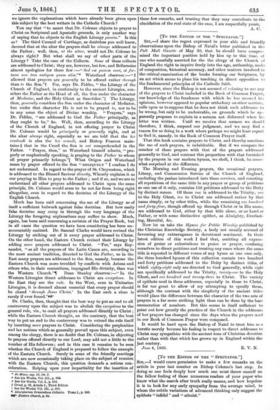[To THE EDITOR OF THE " SPECTATOR. "] SIR,—I share
the regret expressed in your able and friendly observations upon the Bishop of Natal's letter published in the Pall Mall Gazette of May 30, that he should have compro- mised the important position held by him up to this time, of one who manfully asserted for the the clergy of the Church of England the right to inquire freely into the age, authorship, mode of composition, tistorical accuracy, and other matters involved in the critical examination of the books forming our Scriptures, by an act which seems to place his teaching in direct opposition to the fundamental principles of the Catholic faith.
However, since the Bishop is not accused of refusing to use any
of the prayers to Christ included in the Book of Common Prayer, our knowledge of the frankness with which he has avowed his opinions, however opposed to popular orthodoxy on other matters, calls upon us to suppose that he does not think such addresses to be wrong, but only to be undesirable, on grounds which he ap- parently proposes to explain in a sermon not delivered when his letter was written. Until we receive that sermon we should therefore, I think, suspend our judgment, and we may find a reason for so doing in a work where perhaps we might least expect to find it, namely, in the Book of Common Prayer itself.
That this book contains prayers to Christ, and thereby sanctions the use of such prayers, is indubitable. But if we compare the number of these prayers with that of the prayers addressed generally to God, and contrast this proportion with that furnished by the prayers in our modern hymns, we shall, I think, be some- what surprised at the difference.
The Morning and Evening prayers, the occasional prayers.
Litany, and Communion Service of the Church of England, excluding the psalms introduced into these services, and counting all repetitions of the same title in any prayer or group of petitions as one use of it only, contains 156 petitions addressed to the Deity by distinct names. Of these one is addressed to the Trinity, one to the Holy Ghost, ten to Christ are addressed rather by that name simply, or by other titles, while the remaining one hundred and forty-four, though offered up through Christ or in His name, are addressed to God, either by that title alone, or as Lord or Father, or with some distinctive epithet, as Almighty, Everlast- ing, Merciful, &c.
Now let us take the Hymns for Public Worship published by the Christian Knowledge Society, a body not usually accused of favouring any extravagance in devotional sentiment. In their latest edition of this work I find that, omitting all expres- sion of praise or exhortations to praise or prayer, confining ourselves to direct petitions and treating any cases where the same title is repeated in different verses of any hymn as one case only, the three hundred hymns of this collection contain two hundred and forty petitions addressed to the Deity by distinct titles, of which eighty-eight only are directed to God generally, while eight are specifically addressed to the Trinity, twenty-one to the Holy Ghost, and one hundred and twenty-three to Christ. The variety of epithets used in these addresses, especially in those to Christ, is far too great to allow of my attempting to specify them, although the contrast with the simplicity of the ancient titles would place the difference between the character of the two Bete of prayers in a far more striking light than can be done by the bare enumeration of numbers. But this seems in itself sufficient to point out how greatly the practice of the Church in the addresses of her prayers has changed since the days when the prayers used in our Book of Common Prayer were composed.
It would be hard upon the Bishop of Natal to treat him as a heretic merely because his feeling in respect to direct addresses to Christ may sympathize with the ancient tone of Christian devotion rather than with that which has grown up in England within the last century.






























 Previous page
Previous page